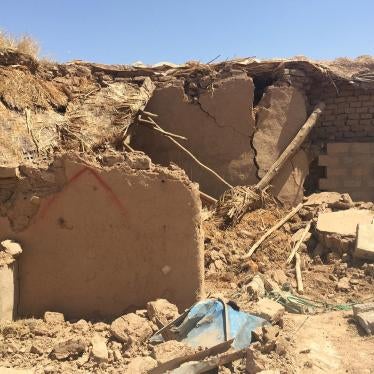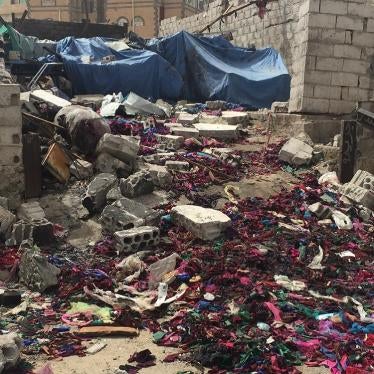(Washington, DC) - Bahraini authorities should set aside a military court ruling on April 28, 2011, sentencing four defendants to death and three others to life in prison for their alleged involvement in the murder of two police officers, Human Rights Watch said today. Human Rights Watch understands that the seven defendants, ages 19 to 24, whose trial and sentencing lasted less than two weeks, are the first civilians to be convicted in special military courts set up after King Hamad bin Isa al-Khalifa declared martial law on March 15.
Authorities accused them of running over two police officers on March 16, 2011, when security forces attacked protesters occupying the Pearl Roundabout in central Manama.
"By establishing these special courts, the government of Bahrain is making it near impossible for defendants to enjoy the rights to which they are entitled," said Joe Stork, deputy Middle East director at Human Rights Watch. "The role of the military prosecutor, the makeup of the special court, and the meager access to legal representation undermine the most basic due process protections."
One defense lawyer who had initially acted in the case was arrested just before midnight on April 15 and lack of information about his whereabouts and well-being gives rise to concern that he may have been forcibly disappeared. Other defense lawyers were called in for questioning in recent days.
Authorities charged the defendants with premeditated murder under Bahrain's 1976 Penal Code and the 2006 counterterrorism law, which mandates the death penalty for certain crimes, including murder, when designated a terrorist crime. The trial began in the special military court, which the government calls the National Safety Lower Court, on April 17 after at least three pretrial sessions in early April. All the defendants pleaded not guilty to charges of premeditated murder. The rulings came four days after Bahrain's military public prosecutor, Col. Yusif Rashid Feleyfel, announced that the government was seeking the death penalty and defense lawyers presented their final pleadings.
Bahrain's Information Affairs Authority announced the death sentences on April 28 for Ali Abdullah Hassan al-Singace, 19; Qasim Hasan Matar Ahmad, 20; Saeed Abd al-Jalil Saeed, 19; and Abd al-Aziz Abd al-Ridha Ibrahim Husain, 24, "for their role in the deaths of policemen Kashef Ahmed Madhoor and Mohammed Farooq Abdulsamad."
The court sentenced Isa Abdullah Kadhim Ali, Sayyed Sadiq Ali Mahdi, and Husain Jafar Abd al-Karim, all age 19, to life in prison.
A defense lawyer who represents one of the defendants told Human Rights Watch that during the trial lawyers were able to meet with their clients only twice - for 30 minutes before the trial began and once again before the final hearing. Unlike regular criminal court proceedings, the lawyer said, a military prosecutor presented the state's case, and a military judge, accompanied by two civilian judges, presided.
The official Bahrain News Agency (BNA) said that family members and others were allowed to attend the trial, although it was not open to the public. Under an April 8 National Safety Court of Appeal decision, media may not publish information about cases pending before the national safety courts to "ensure safety of evidence and guarantee the right of witnesses for legal protection."
A lawyer representing one of the seven men told Human Rights Watch that the defendants may appeal their convictions and sentences to a National Safety Court of Appeals. Those decisions are final and not subject to further appeal. In civilian trials, defendants can appeal criminal sentences to the Higher Court of Appeals, and the Court of Cessation must review all death sentences. On April 28 the BNA acknowledged that Bahrain has observed a "de facto moratorium on capital punishment" but "retained the right to apply the punishment for the most serious of crimes."
Bahrain is a party to the International Covenant on Civil and Political Rights, which includes guarantees for a fair trial. Although neither international law nor the covenant prohibit the establishment of special courts, the UN Human Rights Committee has explicitly confirmed that the trial of civilians by such courts can only be very exceptional and take place under conditions which genuinely afford the full guarantees of a fair trial. These include the right to presumption of innocence and against self-incrimination; the right to be tried before an independent tribunal; the right to a lawyer of the defendants own choice and to have adequate time and facilities for the preparation of a defense including the right to adequate communication with a lawyer and right to call and examine witnesses.
Human Rights Watch opposes the creation and use of special courts to try national security crimes, as it believes that ordinary courts are capable of effectively prosecuting serious crime including terrorist offences. Human Rights Watch also opposes capital punishment in all circumstances because of its irreversible, cruel, and inhumane nature.
"Even during a state of emergency, fundamental rights such as the right to life and the right to a fair trial must always be respected," Stork said. "And any restrictions during a genuine emergency must be strictly limited and justified by the exigencies of the actual situation. Bahrain's obligations as a party to the International Covenant on Civil and Political Rights remain fully in force."
As of April 27, according to the head of the Information Affairs Authority, Shaikh Fawaz bin Mohammed Al Khalifa, authorities had referred 405 detainees to the special military court and released 312. Human Rights Watch is aware of at least four other defendants currently on trial for attempted murder and other crimes before the National Safety Lower Court. On April 20, authorities announced the arrest of a suspect identified as A.Y.A., a 21-year-old male, who allegedly ran down a third police officer, Ahmed al-Muraisi, with a car on March 15, killing him.
One defense lawyer initially involved in the April 28 case, Mohammed al-Tajer, was arrested shortly before midnight at his home on April 15 and has not been heard from since. His wife and colleague lawyers told Human Rights Watch that authorities have not provided any information as to his whereabouts or his well-being, giving rise to concern that he may have been forcibly disappeared. Human Rights Watch has also received reliable information that over the past week Interior Ministry officials summoned four defense lawyers, including at least three involved in this case, and that each was questioned by the military prosecutor for between one-and-a-half and two-and-a-half hours.
Human Rights Watch is concerned that al-Tajer's arrest and the questioning of the other lawyers is a tactic by the government to intimidate and silence defense lawyers. Under the UN Basic Principles on the Role of Lawyers, states are required to guarantee that lawyers are able to perform all of their professional functions without intimidation, hindrance, harassment, or improper interference, and that their security is not threatened as a result of discharging their functions.
Despite the defendants' "not guilty" pleas, Bahrain TV aired a program on April 28, following the announcement of the sentences, in which several of the defendants appeared to describe in detail their plans to kill police officers. Human Rights Watch has reviewed the 24-minute program and believes that one of those shown on the broadcast was Ali Isa Ibrahim Saqer, 34, who died in custody under suspicious circumstances. He had gone to the police station after police officers came to his home looking for him in connection with the death of a police officer who had allegedly been run over by protesters.
Human Rights Watch viewed Saqer's remains during the ritual body washing before he was buried in his home village of Sehla on April 10. His body showed signs of severe physical abuse. Authorities maintained that Saqer had "created chaos" while in detention, "which led security forces to bring the situation under control," resulting in his death. Saqer's case was one of four documented by Human Rights Watch in April in which an individual died under suspicious circumstances while in police custody.
"By videotaping the alleged confessions of these defendants and shamelessly airing them on the day the sentences are handed down, Bahrain is taking a page right out of the propaganda playbook of notorious human rights abusers like Iran," Stork said. "It appears they included the televised confession of a detainee who to all appearances had been tortured to death."
Human Rights Watch called on the Bahraini authorities to immediately release information on the whereabouts and safety of Mohammed al-Tajer as well as hundreds of other detainees who have not been permitted contact with families or lawyers. The authorities should either release them or charge them now with a recognizable offense. In any event, they should have immediate access to lawyers, doctors, and families.






